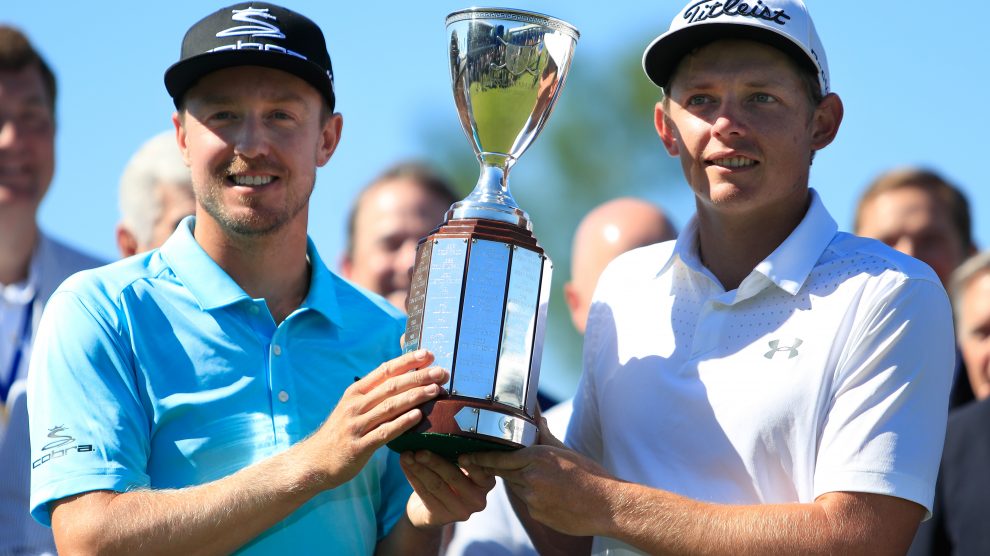When Kevin Kisner holed out in the dark on Sunday night at the Zurich Classic of New Orleans, it just felt right. Nobody cared that the final round took 14 hours to play, or that Jason Day, Rickie Fowler, Henrik Stenson, Justin Rose and other big names weren’t around. It was the emotional crescendo of a week that won in every way.
When that chip rattled the flagstick, the grandstands shook, Kisner went full-NSFW scream, and Jordan Spieth was stunned into temporary silence while granting me an interview. Spieth added a grin to his face, finished his thought and then campaigned to return with Ryan Palmer in 2018.
It took 36 years for the PGA Tour to bring a team format to a Tour stop. It was a home run. I have never experienced a week like this past one in New Orleans.
Golf was fun. The action was full of chest bumps, high fives, laughter and pressure. The pressure wasn’t to win (until Cameron Smith realized what was on the line), but rather to not be the weak link of a partnership.
The 2017 version of the Zurich Classic produced record television numbers early in the week. (Sunday’s storms don’t allow for a proper weekend ratings comparison.) It produced the sixth strongest field, globally, in 2017 to date. It created jealousy by players sitting at home missing out. It created incredible stories.
Where else could a player who has missed 10 of his last 12 cuts, KJ Choi, talk his good friend, Charlie Wi, out of retirement to play, and then be in the penultimate group on Saturday?
Brooks Koepka got to team with his brother Chase, play in front of their entire family and give his younger brother a chance at a PGA Tour future.
There has been second guessing afterwards. Some lament the opportunities taken from players by unique sponsor exemptions. Others wonder if the money and points awarded by teams is a fair tally in an individually played game.
Why worry? Golf has needed an infusion of something new. We can’t clamor for something to grow fan interest and then worry about the minimal consequences that affect very few, if any. We can’t get in the way of progress.
I also agree with writers, like Jason Sobel, that this format shouldn’t be copied. New Orleans now has its edge. It has been built, and they will continue to come. To copy its success would only cannibalize it and the facsimile. There could be other alternatives (team match play, four-man teams) elsewhere, but the future is bright with the success of last week.
For years, New Orleans was about the food. In 2017, it became about the sport, where golf, for a change, became the dinner conversation. Team golf is not going away. That’s awesome.
The Other Winner
Each week, I offer up another player who, while not winning, gained something valuable from the past week.
Chase Koepka – Building on the storyline above, Chase became a bit of a punching bag on social media for the spot he took from a card-carrying member of the PGA Tour. By finishing T5 with brother Brooks, Chase is in the field this week at Wells Fargo. [more eye rolls]
Make the cut and finish high enough, and he could earn enough non-member FedEx Cup points to qualify for the Web.com Tour Finals and set his 2018 future. Not bad for a guy presently on the Challenge Tour. Is it bad for golf?
Yes, it is hard to get PGA Tour starts when your priority ranking is low. Tim Wilkinson finished 50th in the Finals last year. He’s earned 12 starts on the PGA Tour this season. Is that enough? To him, probably not, but not finishing better than T17 this year doesn’t help either.
In a year where Rafa Campos has parlayed his Puerto Rican heritage (and sponsor exemption) into a reboot of his career, similarly great stories like Chase Koepka are refreshing. I watched portions of his play last week, and his brother didn’t carry him to that top-five finish. He played well. He gets a chance this week to prove he belongs. Play well and things work out.

